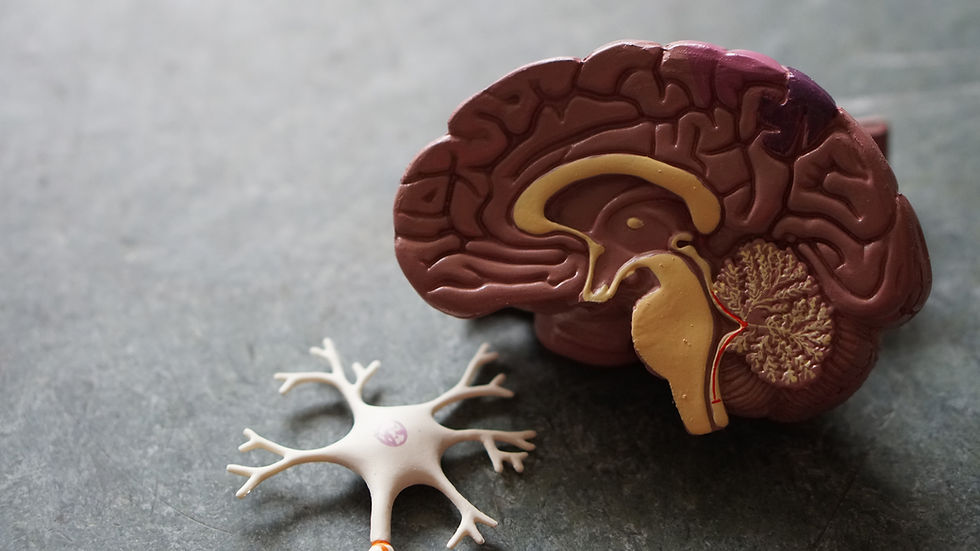Diabetes Type 3? The New Pandemic!
- Adriano dos Santos
- Apr 26, 2023
- 3 min read
Scientists believed that Alzheimer's disease was solely a brain disorder. However, recent studies have suggested a new link between Alzheimer's and diabetes - a link that has led to the condition being dubbed "diabetes type 3."

In essence, diabetes type 3 is a condition in which the brain becomes insulin-resistant, leading to cognitive decline and Alzheimer's disease. Insulin is a hormone that helps regulate glucose (sugar) levels in the body, and when the brain becomes insulin-resistant, it cannot use glucose effectively, leading to damage and cell death.
Scientists have found that the brains of Alzheimer's patients have significantly lower levels of insulin and insulin receptors, indicating that insulin resistance may be a significant factor in the development of the disease. Moreover, people with type 2 diabetes, which is characterized by insulin resistance, have been shown to be more likely to develop Alzheimer's disease.
So, why do scientists believe that Alzheimer's disease is a form of diabetes? The answer lies in the fact that both diseases share several key characteristics, including insulin resistance and inflammation. Both diseases also involve damage to blood vessels, which can lead to a range of health problems.
But what causes insulin resistance in the brain? The answer is complex, and scientists are still working to unravel the underlying mechanisms. However, they believe that a high-sugar, high-fat diet and a sedentary lifestyle may be contributing factors, as these can lead to chronic inflammation and oxidative stress, both of which have been linked to Alzheimer's disease.
In summary, diabetes type 3, or "brain diabetes," is a condition in which the brain becomes insulin-resistant, leading to cognitive decline and Alzheimer's disease. While the underlying mechanisms are still not fully understood, scientists believe that a high-sugar, high-fat diet and sedentary lifestyle may be contributing factors. By understanding the link between diabetes and Alzheimer's, we may be able to develop new treatments and preventative measures for both conditions.
Reference:
de la Monte, S. M., & Wands, J. R. (2008). Alzheimer's disease is type 3 diabetes-evidence reviewed. Journal of diabetes science and technology, 2(6), 1101-1113.
Talbot, K., Wang, H. Y., Kazi, H., Han, L. Y., Bakshi, K. P., Stucky, A., ... & Arnold, S. E. (2012). Demonstrated brain insulin resistance in Alzheimer's disease patients is associated with IGF-1 resistance, IRS-1 dysregulation, and cognitive decline. Journal of clinical investigation, 122(4), 1316-1338.
Craft, S., Baker, L. D., Montine, T. J., Minoshima, S., Watson, G. S., Claxton, A., ... & Plymate, S. R. (2012). Intranasal insulin therapy for Alzheimer disease and amnestic mild cognitive impairment: a pilot clinical trial. Archives of neurology, 69(1), 29-38.
Mosconi, L., Berti, V., Guyara-Quinn, C., McHugh, P., Petrongolo, G., Osorio, R. S., ... & de Leon, M. J. (2017). Perimenopause and emergence of an Alzheimer's bioenergetic phenotype in brain and periphery. PloS one, 12(10), e0185926.
Biessels, G. J., & Reagan, L. P. (2015). Hippocampal insulin resistance and cognitive dysfunction. Nature Reviews Neuroscience, 16(11), 660-671.
Razay, G., Vreugdenhil, A., & Wilcock, G. (2007). The metabolic syndrome and Alzheimer disease. Archives of neurology, 64(1), 93-96.
Razay, G., & Heaton, K. (2008). Correlation between cognitive impairment and insulin resistance in patients with Alzheimer's disease. Journal of Alzheimer's Disease, 13(4), 421-425.
Schilling, M. A., Ferreira, L. C. B., & Yu, Y. (2019). Alzheimer's disease: a glucose metabolic disorder?. Brain research bulletin, 145, 68-73.
Yin, F., Sancheti, H., Patil, I., & Cadenas, E. (2016). Energy metabolism and inflammation in brain aging and Alzheimer's disease. Free Radical Biology and Medicine, 100, 108-122.
Zhao, W. Q., & Alkon, D. L. (2001). Role of insulin and insulin receptor in learning and memory. Molecular and cellular endocrinology, 177(1-2), 125-134.




Comments